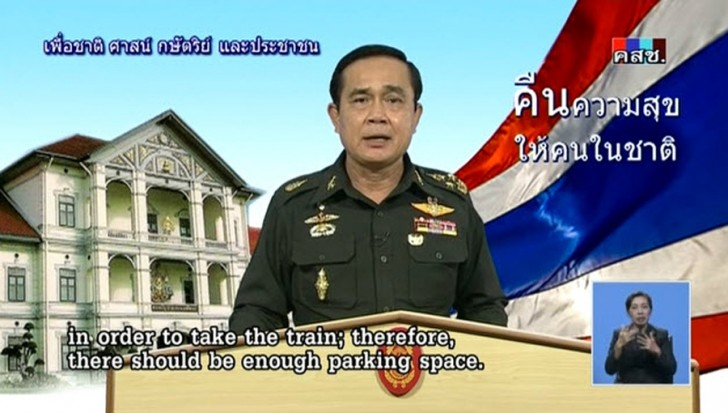KHON KAEN – The military government flipped on a promise not to use a wide-sweeping security measure to push through a high-speed railway project with China that has been delayed by several legal obstacles.
The use of Article 44 of the 2014 interim constitution includes circumventing a ban on repurposing land reserved for forests and agricultural use that the government itself aggressively enforced since it took power three years ago.
On Tuesday, a spokesperson of the government announced that Prime Minister General Prayuth Chan-ocha will enforce his extra legal authority to clear the way for a railway project to connect Thailand with China through Laos. The new rail line will link Bangkok to Nakhon Ratchasima, and ultimately, to Nong Khai.
Four months ago, the government denied rumors that the prime minister would invoke the measure to let Chinese engineers begin construction in Thailand without having to obtain necessary professional licenses first. “The Thai-Chinese rail project will be carried out under regular laws,” said government spokesman Sansern Kaewkamnerd.
The Prayuth government has made no progress in the project, two years after it announced the deal with China to co-invest in the construction of the railway. The military government has resolved to clear away any further issues through the extra legal means of Article 44.
Officials hope that the construction of the first stretch of the 252-kilometer line to Nakhon Ratchasima will commence in August. As the construction is likely to encroach on protected land designated for forest or agricultural use, Article 44 will be invoked to circumvent land use laws overseen by the Agricultural Land and Reform Office (Alro).
Since the military took power in a coup in May 2014, it has been driving an aggressive campaign against land encroachment, filed lawsuits against alleged trespassers, and evicted several communities in the Northeast.
In a recent ruling, the Supreme Administrative Court revoked the license of a wind farm company seeking to develop land designated for farming purposes in Chaiyaphum Province. The decision was welcomed by environmental activists who have long been critical of the misuse of farming land in the Northeast.
The Prayuth administration defended this week’s decision to enforce Article 44 as necessary to prevent a further delay of the railway project. Secretary-General of Alro Sompong Inthong suggested in a Bangkok Post interview that the measure should be used to fast track other development projects.
Article 44 of the 2014 interim constitution should have become defunct after a new constitution came into effect in April of this year. Regardless, the prime minister announced that he would continue to invoke the controversial measure to ensure national security and the progress of the government’s reform efforts.





